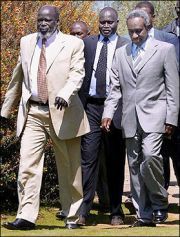Sudannese government, southern rebels narrow differences at peace talks
NAIROBI, Kenya, Oct 16, 2004 (AP) — The Sudanese government has narrowed differences with southern rebels in peace talks to end a two-decade civil war, mediators said Saturday as chief negotiators left the talks in neighboring Kenya to observe the Muslim holy month of Ramadan.
 Sudanese Vice President Ali Osman Taha and southern rebel leader John Garang — the chief negotiators for the warring parties — will rejoin talks on a comprehensive peace deal at an undisclosed date after Ramadan, and expert-level consultations will continue without interruption, said chief mediator Gen. Lazaro Sumbeiywo.
Sudanese Vice President Ali Osman Taha and southern rebel leader John Garang — the chief negotiators for the warring parties — will rejoin talks on a comprehensive peace deal at an undisclosed date after Ramadan, and expert-level consultations will continue without interruption, said chief mediator Gen. Lazaro Sumbeiywo.
More than 2 million people have died in the 21-year conflict, which is separate from fighting in the western region of Darfur, where pro-government Arab militias are accused of waging a campaign of murder, rape and arson on African villagers.
Talks to end the fighting in southern Sudan resumed Oct. 7. The government and rebels agreed to form jointly a national army of 24,000 troops to keep the peace in areas that saw some of their most fierce clashes in the 1990s, said Sayed el-Khatib, a Sudanese government negotiator. Under the agreement each side will contribute 12,000 troops, and the government will provide arms, ammunition and funding.
But warring parties are at odds over a rebel demand to maintain a separate army under their own command in southern Sudan as a security guarantee, Khatib said. The rebels want the government to pay for such a force, a proposal the government negotiator called “problematic.”
“Funding such an army that is not under the national command of the armed forces from the national kitty is problematic,” Khatib told The Associated Press.
They two sides also disagree on how and when to disarm other armed groups in the southern Sudan and how to incorporate members into rebel and government forces, Khatib said.
The conflict broke out in 1983 after the rebels from the mainly animist and Christian south took up arms against the predominantly Arab and Muslim north. Most of the 2 million casualties have come from war-induced famine.
The insurgents say they are fighting for better treatment and for southerners to have the right to choose whether to remain part of Sudan.
Although often simplified as a religious war, the conflict is fueled by historical disputes and competition for resources, including major oil reserves
